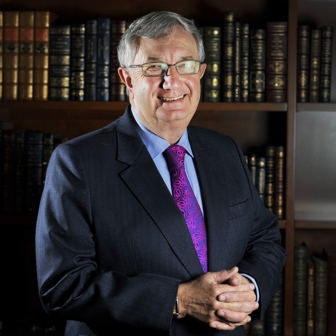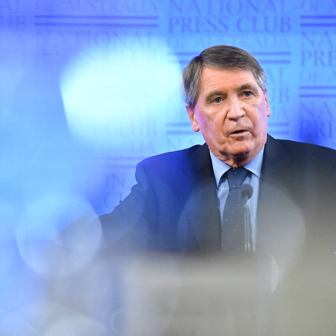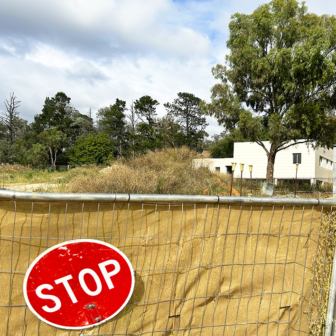The Pursuit of Justice
By Michael Finnane | New Holland | $35 | 308 pages
Several Peter Dutton provocations ago — in between claiming Melbournians are hiding indoors to escape black gangs and offering to fast-track white South Africans to Australia to escape black gangs — the home affairs minister spoke out on how we should choose our judges. “Frankly,” he told Ray Hadley in the closing seconds of one of their Thursday morning interviews, “the state governments should be putting out publicly the names of people that they’re believing they should appoint to the magistrates’ court and let there be public reflection on that.” Dutton’s thought bubble was swiftly rewarded with progressive outrage, this time on the slim basis that he was pushing to adopt the US system of electing judges at the ballot box.
In his new autobiography, a recently retired NSW judge explains how he came to be chosen. One day, Michael Finnane was attending “a morning tea celebration” for another judge when “Reg” — District Court chief justice Reginald Blanch — “asked me if I was prepared to be a judge.” The fifty-seven-year-old barrister “thought about it for a few days and then said yes.” A “formal offer” from state attorney-general Bob Debus followed “shortly afterwards.” Every Australian judge — from lowly magistrates to High Court justices — is selected this way, behind closed doors and without explanation.
Finnane is no fan of Dutton, criticising him in his book, The Pursuit of Justice, for attacking sitting judges. But Dutton, who routinely complains about Australia’s “lily-livered judges and magistrates,” is probably a fan of Finnane. His “public reflection” proposal is surely aimed at selecting more judges like him. In the admittedly small field of judges most Australians have ever heard of, he is far and away the most popular, courtesy of the unprecedented fifty-five-year term he imposed on teen rapist Bilal Skaf in 2002.
Finnane describes how the sentence led to rare judicial fame: a hagiography in the Daily Telegraph, an interview offer from Andrew Denton, Australia-wide talkback radio fandom and a stream of mail with messages like “Thank you Sir, you are our hero and we would like to nominate you as Australian of the Year.” (To date, the only judge to collect Australia’s top prize took the more typical route by chairing Brisbane’s 1982 Commonwealth Games.)
Finnane is no fan of how Americans choose judges — “it seems common to refer to American judges, even justices of the Supreme Court of the United States, as being Republicans or Democrats” — but he never tells his readers why Reg and Bob chose him to be a judge. Those looking for clues have a long read ahead of them, for the bulk of Finnane’s book is about his life before, after and away from the bench. He describes his Rose Bay childhood (“Life in the 1950s was very much different to what it is now”), mentions where he was when he learned that JFK had been shot (cloistered in a Melbourne seminary), and devotes chapters to his service as a military lawyer (“The Army and What It Meant to Me”) and his mission of social justice (“My Contact With Aboriginal People”).
Close readers may piece together a possible origin story for this unlikely judicial superhero. When he received his morning tea appointment, Finnane had been a member of the Australian Labor Party for thirty-three years. In his early years at least, he was a very active party member, serving on the left faction steering committee and on branch, state and federal electorate councils, and even running for the NSW party presidency in the 1970s. Although he left the party on becoming a judge — “it is important that a judge have no political ties” — he rejoined on his retirement, despite regretting its “abandonment of socialist principles.” Finnane stands as a one-man rebuttal of Dutton’s repeated assertion that Labor-appointed left-leaning judges are to blame for soft sentencing.
The ex-judge disclaims any political patronage, noting that his left faction was marginalised in New South Wales and that “my involvement in the 1990s was largely only as a branch member.” But his professional life had a political slant from the very beginning, when he joined the justice department during Jack Renshaw’s premiership. After a decade of private practice during the Askin years, he received his first public role during Neville Wran’s first term as premier, when the state attorney-general offered “a most unusual brief.” Finnane’s job was to inquire into the financial affairs of the late father of the federal primary affairs minister because the attorney-general “didn’t trust” the state’s corporate regulators.
Eventually but dramatically, Finnane accused Ian Sinclair of forging his father’s signature, forcing the son’s temporary resignation from Malcolm Fraser’s cabinet. While his inquiry was beset by leaks and condemned by the prime minister, and the prosecution against the future National Party leader soon failed, Finnane relished his public role and later “had the good fortune to be involved in many royal commissions and inquiries.” During the Wran government, he was appointed to inquiries into drugs in Griffith and local terrorism in Sydney, and he represented Barrie Unsworth’s government at the royal commission into Aboriginal deaths in custody. His final executive role was in the Wood royal commission into state police corruption, set up in the last years of John Fahey’s Liberal government and continuing well into Bob Carr’s first term.
Which brings us to Finnane’s best-known case. In the month before the Sydney Olympics, several young women were cajoled from the city’s shopping centres, schools and trains with promises of drugs or a ride, only to be taken to isolated parks or buildings and raped repeatedly by large groups of men. Eighteen-year-old Bilal Skaf (whose brother was known to one of the victims) was arrested after he was identified by two victims and DNA evidence. Finnane’s appointment to the District Court came that October and the next year he was assigned to preside over the trials of Skaf and his co-accused. “On my way to court for the first Skaf trial,” he writes, “a senior judge expressed to me the view that the only judge to do this sort of trial should be someone with a lot of experience.” At that time (shortly after 9/11 and amid the Tampa federal election campaign), Finnane “had been a judge for a little over a year.”
The new judge would spend most of the next ten months in a courtroom with a bulletproof dock in the Downing Centre, presiding over three consecutive high-profile trials. Each involved claims of gang rape, multiple charges and defendants, disputed identification and confession evidence, and concerted media scrutiny. The trials were also intensely political, and not just because of widespread claims that the rapes were racially motivated.
Two months before the first Skaf trial, Premier Carr met with NSW chief justice James Spigelman to condemn six-year sentences handed down by District Court judge Megan Latham to three teens who pleaded guilty to a different gang rape from the same period. “Nothing I do or say would ever trespass on the independence of the judiciary,” the premier assured the public, “but the fact that the chief justice undertook to meet me I think says something about community concerns.” Midway through Skaf’s second trial, the Court of Criminal Appeal pronounced Latham’s sentences “manifestly inadequate” and doubled them.
Following Skaf’s third trial and conviction, Finnane sentenced the twenty-year-old to the maximum punishment of twenty years for each rape. Allowing for other offences but also some overlap in the charges, Skaf’s total sentence came to fifty-five years, with no possibility of parole until he turned sixty. The judge issued an unusual public denial of having any conversation about the case with the premier. Six months later, Carr had his best (and last) election win.
But Skaf’s hefty sentence didn’t stick. Six weeks after Carr’s resignation from parliament, a panel of three Supreme Court judges ruled that Finnane was wrong to give Skaf the maximum sentence of twenty years because that is reserved for worse rapes, such as those of the elderly, or at knifepoint, or penetration with weapons. As well, the total sentence of fifty-five years seemed aimed at isolating the twenty-year-old from the community rather than punishing him for his crimes. The now twenty-two-year-old’s sentence was ultimately reduced to thirty-seven years and he will be eligible for parole when he is fifty.
Finnane recounts visiting Goulburn jail a decade later and encountering three of Skaf’s co-defendants, then near the end of their own sentences (like Skaf’s, reduced on appeal). The trio told him that “we are innocent; we will become bitter as a result of wasting the best part of our young lives in jail,” leaving the judge to marvel at their “great preoccupation for themselves and no concern about the plight of their victims.” But, as he acknowledges in his book, the evidence against these co-accused was much weaker than the evidence against Skaf. Indeed, they largely owed their convictions to the word of a rapist, Skaf himself, who placed them at the scene when testifying that his victims consented to sex with a group of strangers.
Finnane himself has no regrets about the Skaf trials or the sentences, writing that “my sentences imposed on members of this gang were warranted.” He adds that the appeal judges’ views must “prevail,” but the Court of Criminal Appeal later accused him of refusing to respect their views. In 2008, he was expressly chastised over his management of a trial of a man who brutally raped his ex-partner. According to the court, Finnane not only made wrong rulings about the evidence and distracting, irrelevant and incorrect remarks to the jury, but also gave the offender a sentence for his attack (some twenty-seven years) that exceeded the usual punishment for murder.
Pointing out that “it is impossible to believe that his Honour was not aware of” the appeal court’s rulings in the Skaf case, the unanimous court wrote that sentencing “should not be an idiosyncratic exercise. First instance judges are required to adhere to standards set down by this Court. His Honour would have been well advised to do so in this case.” Unlike Megan Latham, the other District Court judge to sentence the Sydney gang rapists, Finnane would never be promoted to a higher court.
Finnane’s title, The Pursuit of Justice, cleverly captures two related ideas — justice as both mission and vocation. But being a judge was never Finnane’s goal nor, it seems, his passion. He describes choosing a career in the law (albeit with a failed detour to the seminary) at age eleven after seeing The Winslow Boy. The scene that moved him came when a “dominant” barrister conducted a crucial cross-examination in front of a “rather old, worn, man who was the judge.” Admitting to “pondering for most of my working life, what it is that makes judicial life so attractive to lawyers,” he lists an odd grab bag of perks: the District Court’s broad remit, the salary and pension, the “large, usually well-appointed room for the judge,” ten weeks’ break each year and not having “to deal with fractious clients or solicitors.” “Most of all,” he adds, “when you become a judge you feel that you have got to the top of the legal profession.”
So it is no surprise that his book has very little to say about his fifteen years on the bench beyond the expected (and inexplicably early) chapter devoted to Skaf. Near the book’s end, he reveals that, shortly after his “sense of honour was reinforced by the swearing-in-ceremony,” he found that he “was quite cut off from the members of my previous floor.” The floor in question was his professional home away from home, the “Ninth Floor at Selbourne Chambers,” where he “stayed for twenty-one years, most of them happy, but eventually the happiness ceased and I left.” He explains that his subsequent isolation was due to the need for judges to “use considerable discretion about where they go to socialise” and the convention that he be addressed socially as “judge.” (“The conversation at times was quite forced.”)
Finnane’s book doesn’t discuss the last occasion he attracted public attention. In 2011, a lawyer for ex-priest Brian Spillane, then awaiting sentencing by Finnane for child sexual abuse, swore an affidavit about a conversation he’d had with the judge. At (yet another) morning tea, Finnane allegedly told the lawyer and others that “all these paedophiles… should be put on an island and starved to death” and that “they’re all guilty.” The Court of Appeal generously ruled that any “fair-minded observer” would have regarded any such remarks as merely “incautious” and “flippant.” But Finnane ultimately never got to sentence Spillane. A month before he was cleared of bias, he moved from the District Court to the Dust Disease Tribunal, where he served out his time until mandatory retirement.
Was Finnane a good judge? As he explains in his book, lawyers “do not tell you how you are going.” He does recount how “a senior barrister told me in court” that he had “a reputation for rarely being reversed on a question of law.” But he doesn’t mention a newspaper’s calculation that, in 2011 and 2012, his sentences “have been challenged thirty-one times in the Court of Criminal Appeal — more often than any other District Court judge — and the appeals have been upheld nineteen times.” The newspaper quotes an unnamed judge explaining that “once a judge has a reputation for being notoriously tough, it is much more likely that there will be an appeal,” while an unnamed barrister labels him as the type of judge who doesn’t “have a pattern and can be categorised as rogue.” In his book, Finnane candidly recounts that, after his retirement, several barristers confessed to fearing him and one told his wife that he “was cranky and difficult.” He apologises for this, adding that he “did not intend to be anything but relatively relaxed and easy to get on with.”
In bemoaning the plight of American judges, Finnane celebrates how Australian ones “cannot be removed from office merely because a radio commentator or a newspaper campaigns against them.” He probably has in mind California’s Aaron Persky, an elected judge who currently faces a popular recall after giving a six-month sentence to a nineteen-year-old who raped a semi-conscious woman behind a dumpster. This aberrantly low sentence (albeit recommended by the probation service) has few defenders, but the media has found no credible claims of a pattern of low or biased sentencing by Persky, and his defenders say that his removal will force all judges into tougher sentences.
Australian judges can’t be removed for their sentences, low or high, but that doesn’t mean they are completely free of external pressures, especially if they hope for promotion to a higher court while in office or interesting appointments once they retire. Nor are they immune from internal motivations, like gratitude to those who appointed them or the desire for attention or appreciation in office or after.
The publication of Finnane’s autobiography coincides with a tough period for Australia’s many magistrates, who decide the bulk of the nation’s sentences and lack most of the perks of higher judicial office. One week after Dutton suggested exposing prospective magistrates to public reflection, he told Ray Hadley that “people are angry about sentences where there’s a maximum eight-year penalty and people are given two months or no conviction recorded for kicking the head of a police officer, as we’ve seen in Victoria in the last couple of days.” He was referring to a teen parolee who kicked a police officer’s head at Melbourne’s Highpoint Shopping Centre. Egged on by the Police Association, the media and the police minister attacked Victoria’s summary judges for their decisions to grant him bail and probation.
A month later, undaunted, magistrate Stephen Myall reportedly deferred further charges against the teen until December to allow him to finish high school. A week later, Melbourne’s legal community mourned Myall’s sudden death, aged sixty, and sought a review of magistrates’ workplace safety in the face of high workloads and a “steady stream of confronting evidence of violence and sexual abuse.” At his funeral in Kyneton, his family and colleagues spoke of Myall’s love of being a magistrate, his lack of interest in money, his endless committee work and how “the political debate on law and order did his head in.” A solicitor friend said he “wondered why then attorney-general Rob Hulls thought a crazed, part-time lumberjack rev-head who dressed like a vagrant was an ideal person to make decisions about other people’s lives,” adding that Hulls had made “a wonderful decision.”
Finnane’s own story ends with a chapter recounting his retirement work for Sri Lanka and Tuvalu and his advocacy on fair trade coffee and climate change. “Life has enabled me to engage with many wonderful people and because of my knowledge of law, to help them,” he writes. Celebrating his healthy, friendly and large family, he concludes, “Life is good.” I certainly don’t begrudge the ex-judge his contentment in retirement, nor for that matter his successful career or his recognition of the seriousness of rape in his sentencing decisions. Yet I find his evident pride at receiving “a comment about the Skaf case and my part in it just about every week” disturbing, given the awful crimes that lie behind those words and the miserable politics that thrive on such horrors. ●




